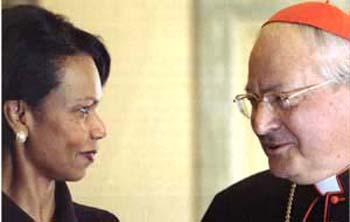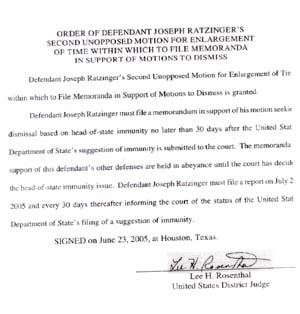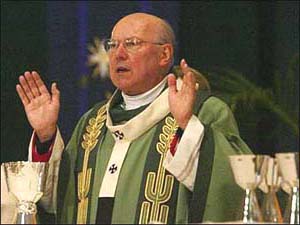BENEDICT XVI NAMED AS A DEFENDANT IN AN AMERICAN LAWSUIT - There is a recent follow-up to the lawsuit against Pope Benedict XVI accusing him of covering up the sexual abuse of three children in Houston, Texas. Representatives of the Pope asked President George Bush to confirm that Benedict XVI benefits from juridical immunity as the Head-of-State of the Vatican. If immunity is granted, the Pope is exempt from liability as a defendant.

Cardinal Sodano asked Condoleezza Rice for the help of the State Department in the court case - America, April 4, 2005
|
Attorney-of-law Daniel Shea, one of the American lawyers who filed a lawsuit in June 2004 against Cardinal Ratzinger, speaks on behalf of one of the three children who allegedly were abused by a Houston seminarian in 1996. Shea argues that Bush has no power to decide the request for immunity, since the matter relies on the Texas district judge in charge of the suit. He affirms that if President Bush decides in favor of immunity, as requested by the papal nuntiature in Washington, he will appeal the decision in court (Estado de Sao Paulo, August 17, 2005; Houston Voice online, August 29, 2005).
In Washington, U.S. State Department spokeswoman Gerry Keener stated on August 16 that the Pope is considered a Head-of-State and automatically has diplomatic immunity. She said that Benedict does not have to ask for immunity and Bush does not have to grant it (Sydney Morning Herald online, August 17, 2005).
The issue doesn’t seem to be as simple as Keener presents it, since “defendant Ratzinger” was ordered by District Judge Lee Rosenthal to submit an official opinion of the Department of State confirming his argument that he is exempt from charges as a Head-of-State. This explains the reason for the papal nuntiature’s request. So, the Department of State must issue an opinion for the suit to progress.
Further, Tahira Merrit, the lawyer for the other two plaintiffs, is protesting that Joseph Ratzinger cannot benefit from that immunity since he was not a Head-of-State when he wrote the letter that allegedly advised Prelates to keep the cases of sexual abuse by ecclesiastical persons secret (Brenda Jeffrey, Esq., online article “Holy Order?” September 5, 2005).
This is the serious picture Benedict XVI faces today in this case.
 Defendant Joseph Ratzinger is ordered by Judge Rosenthal to ask the State Department's opinion - Internet photocopy Defendant Joseph Ratzinger is ordered by Judge Rosenthal to ask the State Department's opinion - Internet photocopy
|
For the reader who missed the first part of the story, I will supply some background facts.
1. On May 18, 2001, Cardinal Ratzinger, then Prefect of the Congregation for the Doctrine of the Faith, wrote a letter to the Catholic Bishops on how to handle sacramental and moral abuses that were occurring in the Church. Some who read the letter say that it dealt with the Sacraments and the sexual abuse of minors by priests and ecclesiastical persons; others say that it dealt only with canonical problems regarding the Sacraments.
In any case, the media report that when the letter referred to ecclesiastic trials of priests charged with the sexual abuse of minors, it ordered that “cases of this kind are subjected to the pontifical secret” (Houston Voice online, August 29, 2005). That is to say, it asserted the Church’s right to hold inquiries behind closed doors and keep the evidence confidential. Breaching the pontifical secret carries serious penalties.
Ratzinger’s defenders affirm that the demand for secrecy did not refer to cases of sexual abuse and the letter did not order Bishops to hide cases of sexual abuse from the civil authorities.
But the accusers say that the letter imposed two orders of silence on Bishops: one general, encompassing all the topics addressed in it, and one specific, when it ordered Bishops to judge the pedophile priests in ecclesiastic courts and refer these crimes only to the Congregation of the Faith. In response to those who say the letter dealt only with protocol questions regarding sacraments, the accusers point out that it referred not only to the sexual abuse of minors by priests, a clear moral question, but also mentioned the moral sin of bestiality, hardly a protocol issue.
So far, these are the principal data regarding Ratzinger’s letter.
2. Let me say a word about the lawsuit.
In 1996 when Juan Carlos Patino-Arango was studying for the priesthood at St. Mary’s Seminary in Houston and serving at St. Francis de Sales Church, he allegedly sexually molested three children, ages 11, 12 and 13, during counseling sessions (Houston Voice online, August 29, 2005).
In May 2004, Patino-Arango was indicted with criminal charges by a Harris County grand jury and today is a fugitive from justice, the lawsuit says (Detroit Free News online, August 18, 2005).
In June 2004 a lawsuit was filed in a southern district of Texas accusing three defendants – the Archdiocese of Galveston-Houston, its Archbishop Joseph Fiorenza, and Cardinal Joseph Ratzinger – of conspiracy to keep Juan Carlos Patino-Arango from being prosecuted by American justice. According to the prosecution, the Archdiocese of Galveston-Houston and Joseph Fiorenza covered up the sexual abuses of Patino-Arango and moved him out of the country to avoid his prosecution by the civil courts.
Ratzinger is considered an accomplice of that cover up because he allegedly ordered Bishops to take such action in his May 2001 letter.
However, an Archdiocesan spokesman said that as soon as the accusations against the seminarian were brought to its knowledge, he was removed from St. Francis de Sales parish, retained in the seminary, and finally returned to Colombia, with the due knowledge of the police (Houston Voice, ibid.).
3. Although many people believe – I include myself on this list – that in the conciliar Vatican there are guidelines for Bishops to cover up ecclesiastic homosexuals and pedophiles, it doesn’t seem likely that this attempt by lawyers Shea and Merrit will succeed. Previous efforts to take the Vatican to court based on another similar document by Church authorities failed for different reasons. I am referring to the document Crimen sollicitationis [the crime of solicitation], issued in 1962 under John XXIII and signed by Cardinal Ottavianni.
It is more probable that after a time, during which the State Department will negotiate advantages with the Vatican in exchange for its cooperation, the case will be laid to rest. But it should not be excluded that there could be a long process supported by some radical Protestant forces to demoralize Benedict XVI.
In any circumstance, one can see that it is an enormous embarrassment for Benedict XVI to be named a defendant in such a lawsuit.
There is a final question to which I did not find a satisfactory answer: Since Cardinal Ratzinger had already been named a defendant in this lawsuit that began before John Paul II’s death, why did the Cardinals elect him? It is not clear whether the Cardinals imagined that Ratzinger would be easily absolved in this case, or if they realized that the lawsuit would continue and chose him anyway. Why?

Archbishop Levada in his farewell Mass at the San Francisco Cathedral, August 7. He was subpoenaed to testify about sex abuse cases involving other clergy - CBS online, August 8, 2005
|
NO IMMUNITY FOR LEVADA - A federal judge has agreed to let Archbishop William Levada skip an August court date to answer questions under oath about the Church’s handling of sexual abuse allegations against priests in the Portland Archdiocese from 1986 to 1995, when he was its Archbishop. Levada is the present day Prefect of the Congregation for the Doctrine of the Faith.
In return, Archbishop Levada must personally guarantee that he will appear in January to undergo questioning by attorneys for 250 victims in clergy abuse lawsuits against the Archdiocese of Portland. As part of the agreement, Levada cannot claim diplomatic immunity as a high-ranking official of the Vatican (National Catholic Reporter, August 12, 2005).
Both the Pope and the Prefect of the Congregation for the Doctrine of the Faith are today subject to questioning in American civil courts… No more independence for the Papacy and the Holy See. It seems a quite unexpected consequence of the last 40 years of liberalization of the Church’s morals and discipline.

|